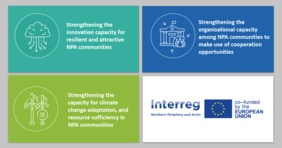The NPA programme has a tradition of involving regional and project stakeholders in the drafting process, to ensure that the programme’s approach is rooted in the needs of the programme area.
The Programme Planning Group, who is in charge of drafting the Cooperation Programme, is looking for input that can help finetune the document and form the basis for a well-functioning NPA 2021-2027.
For this reason, the drafting team invites feedback on the draft Cooperation Programme document from a wide range of stakeholders, including:
- NPA projects and former projects
- Regional Advisory Group members
- local, regional and national decision makers and other stakeholders from the programme area and neighbouring regions with an interest in regional development and cooperation, including organisations representing indigenous communities
- other Interreg programmes and ENI programmes with an overlapping geography policy initiatives and international cooperation structures related to the Arctic as well as the Atlantic.
An online survey is open between 22nd April and 7th May allowing interested respondents to provide written feedback on the draft Cooperation Programme for the NPA 2021-2027. Go to the online survey
Good to know
Several important aspects of the future NPA programme are currently still unclear. For example, the exact programme budget. Based on information currently available, it is clear that the budget will decrease compared to the current programme. The budget will affect the number of projects that can be supported, and the size of the programme administration. For this reason, the draft Cooperation Programme document will need to be adapted as these elements fall into place over the coming period.
Besides this, it is important to highlight that the programme strategy and draft Priorities are focussed on those themes and types of activities that are deemed to benefit most from transnational cooperation between the regions in the NPA area.
For 20 years, the NPA programme has provided a framework for regions to work together with a focus on promoting sustainable development in remote and sparsely populated communities. In this way, the NPA programme both complements and differentiates itself from other programmes, policy instruments, strategies, and funding mechanisms that exist in the same territory.
Background: the programming process
In the Spring of 2020, the preparations for the NPA 2021-2027 started under the guidance of the Programme Planning Group (PPG), which consists of national and regional representatives from 7 countries (Member States Finland, Ireland, and Sweden in cooperation with the Faroe Islands, Greenland, Iceland and Norway) and observers from Canada, Russia, NORA, and the Arctic Council’s Indigenous Peoples Secretariat.
As a first step, during the summer of 2020, an area analysis was carried out by the European Policies Research Centre, which provides the context for transnational cooperation in this part of Europe. This analysis looked at the main joint challenges in the programme area, taking into account: economic aspects and innovation, green development and the environment, connectivity and networks, community and people, lessons learnt from past experience, as well as complementarity with other forms of support and territorial strategies. Based on the analysis, the PPG has agreed on a range of themes for the future NPA programme, or Policy Objectives and underlying Specific Objectives as they are called in the draft EU regulations.
In February-March 2021, a consultation of the draft Priorities for the forthcoming NPA 2021-2027 took place, including 3 consultation workshops entitled “Shape the future NPA”. Valuable input from the consultations was used to update the Priorities.
Besides the Priorities, other chapters of the draft Cooperation Programme document were presented to the Programme Planning Group at their meeting on 14th April. The PPG agreed to the draft document that is now made available for a public consultation.
Your input will be used to compile the final draft Cooperation Programme document, which is planned to be ready by June 2021, when national approval processes are expected to start, prior to submission of the document to the European Commission in the autumn.

